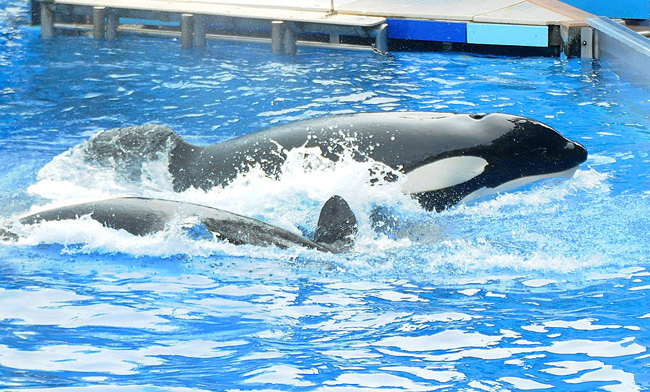
Tilikum, the orca featured in the 2013 SeaWorld documentary Blackfish, died Friday morning. The 36-year-old orca had been suffering from a “persistent and complicated bacterial lung infection” since March of last year, although an exact cause of death has yet to be determined. The park stated that Tilikum died surrounded by trainers, care staff and veterinarians.
The film focused on Tilikum to document the abuse and consequences of keeping these animals in captivity, as the orca, captured in 1983 off the coast of Iceland, had been responsibly for three human deaths — most recently his trainer Dawn Brancheau in SeaWorld Orlando in 2010. The response to the film resulted in a huge backlash to SeaWorld, with many celebrities and musicians calling for a boycott of the theme park.
Joel Manby, the President and CEO of SeaWorld, released a statement Friday expressing his condolences on the famous orca’s passing, saying: “Tilikum had, and will continue to have, a special place in the hearts of the SeaWorld family, as well as the millions of people all over the world that he inspired. My heart goes out to our team who cared for him like family.”
PETA, People for the Ethical Treatment of Animals, are naturally not buying SeaWorld’s words of consolation, and were quick to remind everyone of the decades of suffering Tilikum experienced prior to his death.
BREAKING: After 33 years in captivity, Tilikum—who was the subject of #Blackfish—is dead. #RIPTilikum pic.twitter.com/Duj9KOEJbo
— PETA (@peta) January 6, 2017
Suffice to say, many others echoed a similar sentiment, as an outpouring of support for Tilikum and anger towards SeaWorld surfaced on Twitter:
Heartbroken that #Tilikum never got to swim free. @SeaWorld held him captive & kept him suffering until his last day. A truly cruel company.
— steff (@steffclarkey) January 6, 2017
How can people be sad #Tilikum has died? Be sad he lived such an awful life. Watch #blackfish and boycot @SeaWorld
— Kayla McCormack Yoga (@KaylaMcCormack5) January 6, 2017
Guys. #Tilikum died and I seriously want to cry. At least he's free and at peace. pic.twitter.com/u0eFleB1IE
— 😈🐕🐾 Pooka Princess 🎃 😵💫🏴☠️ (@Crazysorts) January 6, 2017
RIP Tilikum. I apologise on behalf of the human race for how we have treated you. You deserved so much better ❤ #Tilikum #Blackfish
— 𝑱𝒆𝒔𝒔 𝑫𝑾 💎 (@jjjjessyj) January 6, 2017
#Tilikum, the whale who spent 33 painful, lonely years in captivity, and who was the focus of #Blackfish, has died. His soul is now free.
— Dr. Marcus Papadopoulos (@DrMarcusP) January 6, 2017
#Tilikum has passed away. my heart aches for the life he had at seaworld.
— jessica (@JESSWHlTTlNGHAM) January 6, 2017
Hopefully one day we won't keep these animals in captivity! #Tilikum @blackfishmovie X pic.twitter.com/R0pU84hNPz
— The Sundowners (@TheSundownersUK) January 6, 2017
Watch #Blackfish on #Netflix See how #Tilikum changed public opinion on #SeaWorld #OpSeaWorld https://t.co/3zusNIzAUU
— 0ct0n0n (@0ct0n0n) January 6, 2017
https://twitter.com/BeauPrincesse/status/817426126964477952
https://twitter.com/BiologistDan/status/817424880148815873
https://twitter.com/georgmcbusted/status/817424544117956612
https://twitter.com/kolo515/status/817428743081914368
I hope this hashtag will raise awareness and get people watching @blackfishmovie to see why Whales shouldn't be in captivity #Tilikum
— Laura Jane (@laurajanesocial) January 6, 2017
https://twitter.com/_connietaylor/status/817424627970506753
https://twitter.com/kalel_culver/status/817424597943455744
Killer whales can live up to 100 years old. Tilikum died at 36. When will people realise this and stop going to Seaworld #Tilikum
— beth tolley (@beth_tolley) January 6, 2017
If there is anyone still supporting @SeaWorld after the death of #Tilikum I urge you to watch the documentary Blackfish.
— onnalise (@starshollowed) January 6, 2017
https://twitter.com/SportzAuraDora/status/817430436406300676
https://twitter.com/MatthewKick/status/817434094061625344
R.I.P., Tilikum. It’s with any hope that his life and subsequent death will have an effect on the way these magnificent creatures are treated by humans in future generations.
(Via USA Today)
